- Forum
- categories
- Resource recovery
- Resource recovery from excreta, faecal sludge or wastewater
- Production of biochar, fuel or electricity
- Urine-tricity - Electricity from urine (University of the West of England, UK) - updates
Urine-tricity - Electricity from urine (University of the West of England, UK) - updates
47.4k views
Further to our last update, I'm pleased to provide the link to our latest press release about the
first overseas Pee Power trial
installed at a girls' boarding school in western Uganda in July.
Please Log in to join the conversation.
You need to login to reply
We're pleased to say that our Urine-tricity research project received further funding from the Bill & Melinda Gates Foundation. The
Phase III grant
for $1.6 million over 2 years is helping our team at the University of the West of England (UWE Bristol) to continue lab research, to move towards developing a commercial ‘Pee Power’ product, and to set up field trials for testing it in developing country locations.
‘Pee Power’ uses urine as fuel that feeds microbial fuel cells (MFCs) to generate electricity while cleaning the wastewater. The project began in 2011 with a relatively small Gates Foundation Phase-I grant for $100k and since then has hit several milestones, including using urine fed MFCs to charge mobile phones and to generate electricity for lighting, and demonstrating the killing of pathogens and production of catholyte as a disinfectant. Please see the journal articles (linked below) for more information on the scientific research outcomes.
After further lab research and technology development with a Phase II grant, Phase III is seeing the MFC stacks being moved towards a commercial product and piloted for the first time in developing country locations that lack sanitation infrastructure and reliable electricity access. The first field trial is currently being set up at a girls' boarding school in Uganda to provide lighting for their toilets at night. We look forward to posting a related press release shortly. The field trials will provide valuable data on the long-term performance of MFCs in challenging environments, while benefiting the local users.
The following press releases might also be of interest, as they give further information about the project activities and how the technology works:
June 2017 Pee Power at Glastonbury festival
Dec 2016 Pee Power at Royal Institution
March 2015 Pee Power to light camps at disaster zones
The following are published articles from 2015 onwards arising from the Gates funded Urine-tricity project (links to earlier papers have already been posted in this thread):
Gajda, I., Greenman, J., Melhuish, C., & Ieropoulos, I. A. (2016). “Electricity and disinfectant production from wastewater: Microbial Fuel Cell as a self-powered electrolyser.” Scientific Reports, 6, 25571. doi.org/10.1038/srep25571
Gajda, I., Greenman, J., Melhuish, C., Santoro, C., Ieropoulos, I. (2016) “Microbial Fuel Cell-driven caustic potash production from wastewater for carbon sequestration.” Bioresource Technology, Volume 215, 2016, Pages 285-289, ISSN 0960-8524, dx.doi.org/10.1016/j.biortech.2016.04.004.
Gajda, I., Stinchcombe, A., Greenman, J., Melhuish, C. and Ieropoulos, I. (2015) "Ceramic MFCs with internal cathode producing sufficient power for practical applications "International Journal of Hydrogen Energy. 40 (42), 14627–14631. © Elsevier.
Gajda, I., Greenman, J., Melhuish, C., Santoro, C., Li, B., Cristiani, P. and Ieropoulos, I. (2015) "Electro-osmotic-based catholyte production by Microbial Fuel Cells for carbon capture" Water Research. © Elsevier. 86, 108–115. DOI:10.1016/j.watres.2015.08.014
Ieropoulos I, Pasternak G, Greenman J (2017) Urine disinfection and in situ pathogen killing using a Microbial Fuel Cell cascade system. PLoS ONE 12(5): e0176475. doi.org/10.1371/journal.pone.0176475
Ieropoulos, I., Stinchcombe, A., Gajda, I., Forbes, S., Merino-Jimenez, I., Pasternak, G., Sanchez-Herranz, D. and Greenman, J. (2016) “Pee power urinal – Microbial fuel cell technology field trials in the context of sanitation.” Environmental Science: Water Research & Technology. ISSN 2053-1419.
Ieropoulos, I., Winfield, J., Gajda, I., Walter, A., Papaharalabos, G., Jimenez, I.M., Pasternak, G., You, J., Tremouli, A., Stinchcombe, A., Forbes, S., Greenman, J. (2015) Microbial Electrochemical and Fuel Cells: Fundamentals and Applications. Woodhead Publishing, 2015, 357-380.
Merino Jimenez, I., Celorrio, V., Fermin, D. J., Greenman, J. and Ieropoulos, I. (2017) Enhanced MFC power production and struvite recovery by the addition of sea salts to urine. Water Research, 109. pp. 46-53. ISSN 0043-1354 Available from: eprints.uwe.ac.uk/30306
Pasternak, G., Greenman, J. and Ieropoulos, I. (2017) “Self-powered, autonomous Biological Oxygen Demand biosensor for online water quality monitoring.” Sensors and Actuators B: Chemical, 244. pp. 815-822. ISSN 0925-4005 Available from: eprints.uwe.ac.uk/31636
Pasternak G, Greenman J, Ieropoulos I. (2016) “Comprehensive Study on Ceramic Membranes for Low-Cost Microbial Fuel Cells.” ChemSusChem 2016; 9:88–96. doi:10.1002/cssc.201501320
Pasternak G, Greenman J, Ieropoulos I. (2016) “Regeneration of the power performance of cathodes affected by biofouling.” Applied Energy, 2016, Vol 173, 431–437.
XA Walter, A Stinchcombe, J Greenman, I Ieropoulos (2017). “Urine transduction to usable energy: a modular MFC approach for smartphone and remote system charging” Applied Energy 192, 575-581. www.sciencedirect.com/science/article/pii/S0306261916307814
‘Pee Power’ uses urine as fuel that feeds microbial fuel cells (MFCs) to generate electricity while cleaning the wastewater. The project began in 2011 with a relatively small Gates Foundation Phase-I grant for $100k and since then has hit several milestones, including using urine fed MFCs to charge mobile phones and to generate electricity for lighting, and demonstrating the killing of pathogens and production of catholyte as a disinfectant. Please see the journal articles (linked below) for more information on the scientific research outcomes.
After further lab research and technology development with a Phase II grant, Phase III is seeing the MFC stacks being moved towards a commercial product and piloted for the first time in developing country locations that lack sanitation infrastructure and reliable electricity access. The first field trial is currently being set up at a girls' boarding school in Uganda to provide lighting for their toilets at night. We look forward to posting a related press release shortly. The field trials will provide valuable data on the long-term performance of MFCs in challenging environments, while benefiting the local users.
The following press releases might also be of interest, as they give further information about the project activities and how the technology works:
June 2017 Pee Power at Glastonbury festival
Dec 2016 Pee Power at Royal Institution
March 2015 Pee Power to light camps at disaster zones
The following are published articles from 2015 onwards arising from the Gates funded Urine-tricity project (links to earlier papers have already been posted in this thread):
Gajda, I., Greenman, J., Melhuish, C., & Ieropoulos, I. A. (2016). “Electricity and disinfectant production from wastewater: Microbial Fuel Cell as a self-powered electrolyser.” Scientific Reports, 6, 25571. doi.org/10.1038/srep25571
Gajda, I., Greenman, J., Melhuish, C., Santoro, C., Ieropoulos, I. (2016) “Microbial Fuel Cell-driven caustic potash production from wastewater for carbon sequestration.” Bioresource Technology, Volume 215, 2016, Pages 285-289, ISSN 0960-8524, dx.doi.org/10.1016/j.biortech.2016.04.004.
Gajda, I., Stinchcombe, A., Greenman, J., Melhuish, C. and Ieropoulos, I. (2015) "Ceramic MFCs with internal cathode producing sufficient power for practical applications "International Journal of Hydrogen Energy. 40 (42), 14627–14631. © Elsevier.
Gajda, I., Greenman, J., Melhuish, C., Santoro, C., Li, B., Cristiani, P. and Ieropoulos, I. (2015) "Electro-osmotic-based catholyte production by Microbial Fuel Cells for carbon capture" Water Research. © Elsevier. 86, 108–115. DOI:10.1016/j.watres.2015.08.014
Ieropoulos I, Pasternak G, Greenman J (2017) Urine disinfection and in situ pathogen killing using a Microbial Fuel Cell cascade system. PLoS ONE 12(5): e0176475. doi.org/10.1371/journal.pone.0176475
Ieropoulos, I., Stinchcombe, A., Gajda, I., Forbes, S., Merino-Jimenez, I., Pasternak, G., Sanchez-Herranz, D. and Greenman, J. (2016) “Pee power urinal – Microbial fuel cell technology field trials in the context of sanitation.” Environmental Science: Water Research & Technology. ISSN 2053-1419.
Ieropoulos, I., Winfield, J., Gajda, I., Walter, A., Papaharalabos, G., Jimenez, I.M., Pasternak, G., You, J., Tremouli, A., Stinchcombe, A., Forbes, S., Greenman, J. (2015) Microbial Electrochemical and Fuel Cells: Fundamentals and Applications. Woodhead Publishing, 2015, 357-380.
Merino Jimenez, I., Celorrio, V., Fermin, D. J., Greenman, J. and Ieropoulos, I. (2017) Enhanced MFC power production and struvite recovery by the addition of sea salts to urine. Water Research, 109. pp. 46-53. ISSN 0043-1354 Available from: eprints.uwe.ac.uk/30306
Pasternak, G., Greenman, J. and Ieropoulos, I. (2017) “Self-powered, autonomous Biological Oxygen Demand biosensor for online water quality monitoring.” Sensors and Actuators B: Chemical, 244. pp. 815-822. ISSN 0925-4005 Available from: eprints.uwe.ac.uk/31636
Pasternak G, Greenman J, Ieropoulos I. (2016) “Comprehensive Study on Ceramic Membranes for Low-Cost Microbial Fuel Cells.” ChemSusChem 2016; 9:88–96. doi:10.1002/cssc.201501320
Pasternak G, Greenman J, Ieropoulos I. (2016) “Regeneration of the power performance of cathodes affected by biofouling.” Applied Energy, 2016, Vol 173, 431–437.
XA Walter, A Stinchcombe, J Greenman, I Ieropoulos (2017). “Urine transduction to usable energy: a modular MFC approach for smartphone and remote system charging” Applied Energy 192, 575-581. www.sciencedirect.com/science/article/pii/S0306261916307814
Please Log in to join the conversation.
You need to login to reply
About one year after the former post the following information now came available on a building website:
Bristol BioEnergy Centre
Ecobots and fuel cell
The Microbial Fuel Cell (MFC)is a technology that can directly convert organic waste into electricity. The Bioenergy and Self Sustainable Systems Theme is all about bringing this technology to the real world and making the utilisation of waste into energy a reality. Furthermore, being able to generate electricity from naturally occurring biomass, gives robots a novel degree of autonomy that allows their prolonged operation in environments that are inaccessible or even lethal to human beings.
Breaking News
The team has recently demonstrated for the first time the charging of a commercially available mobile phone, using Microbial Fuel Cells (MFCs) fed with real neat urine. The membrane-less MFCs were made out of ceramic material and employed plain carbon based electrodes. View the relevant scientific publication.
Video is visible on: www.brl.ac.uk/researchthemes/bioenergyself-sustaining.aspx
and a large number of other links on the subjest.
Bristol BioEnergy Centre
Ecobots and fuel cell
The Microbial Fuel Cell (MFC)is a technology that can directly convert organic waste into electricity. The Bioenergy and Self Sustainable Systems Theme is all about bringing this technology to the real world and making the utilisation of waste into energy a reality. Furthermore, being able to generate electricity from naturally occurring biomass, gives robots a novel degree of autonomy that allows their prolonged operation in environments that are inaccessible or even lethal to human beings.
Breaking News
The team has recently demonstrated for the first time the charging of a commercially available mobile phone, using Microbial Fuel Cells (MFCs) fed with real neat urine. The membrane-less MFCs were made out of ceramic material and employed plain carbon based electrodes. View the relevant scientific publication.
Video is visible on: www.brl.ac.uk/researchthemes/bioenergyself-sustaining.aspx
and a large number of other links on the subjest.
Sjoerd from The Netherlands.
Pronounce: 'Sured'
Some of my work on: www.nienhuys.info
for correspondence: This email address is being protected from spambots. You need JavaScript enabled to view it.
Pronounce: 'Sured'
Some of my work on: www.nienhuys.info
for correspondence: This email address is being protected from spambots. You need JavaScript enabled to view it.
Please Log in to join the conversation.
You need to login to reply- iaieropoulos
-
 Topic Author
Topic Author- Converting waste into useful energy
Less- Posts: 11
- Karma: 1
- Likes received: 3
Re: Reply: Urine-tricity+-+Electricity+from+urine+(University+of+the+West+of+England,+UK)+-+updates
Hi Prince
Thank you for taking an interest in our work, we are in the process of working with collaborators as part of our project and it would be interesting to see how we could work together if the circumstances allow.
Please contact me on my email address above and we can discuss this further.
Yannis
Thank you for taking an interest in our work, we are in the process of working with collaborators as part of our project and it would be interesting to see how we could work together if the circumstances allow.
Please contact me on my email address above and we can discuss this further.
Yannis
Dr. Ioannis A. Ieropoulos
Associate Professor
EPSRC Career Acceleration Fellow
BioEnergy & Self Sustainable Systems Theme Leader
Bristol Robotics Laboratory
T-Building
Frenchay Campus, (North Entrance)
Bristol, BS16 1QY
Tel: +44(0)1173286318, 86322 Fax: +44(0)1173283960
Email: This email address is being protected from spambots. You need JavaScript enabled to view it. Web: www.brl.ac.uk/researchthemes/bioenergyselfsustainable.aspx
Associate Professor
EPSRC Career Acceleration Fellow
BioEnergy & Self Sustainable Systems Theme Leader
Bristol Robotics Laboratory
T-Building
Frenchay Campus, (North Entrance)
Bristol, BS16 1QY
Tel: +44(0)1173286318, 86322 Fax: +44(0)1173283960
Email: This email address is being protected from spambots. You need JavaScript enabled to view it. Web: www.brl.ac.uk/researchthemes/bioenergyselfsustainable.aspx
Please Log in to join the conversation.
You need to login to reply- prince
-
Less
- Posts: 6
- Likes received: 0
Re: Reply: Urine-tricity+-+Electricity+from+urine+(University+of+the+West+of+England,+UK)+-+updates
Was interested in your good work to produce electricity through wastes,we are a group of small young volunteers in Kenya with great passion to invest in human urine plant to produce hydrogen nitrogen gas and fertilizers.
As a new concept in Kenya,we need partners with experience in the field and funding.
How can we have partnership with this university in UK to help in Kenya and funding donor.
Thank you
Prince Maloba
As a new concept in Kenya,we need partners with experience in the field and funding.
How can we have partnership with this university in UK to help in Kenya and funding donor.
Thank you
Prince Maloba
Please Log in to join the conversation.
You need to login to reply- iaieropoulos
-
 Topic Author
Topic Author- Converting waste into useful energy
Less- Posts: 11
- Karma: 1
- Likes received: 3
Pee Power at Glastonbury Festival 2015
Toilets have always been one of the big talking points at Glastonbury, but this year the festival audience are being invited to put their pee to good use by providing fuel for the 'Pee Power' project. The project is led by the Bristol BioEnergy Centre in the Bristol Robotics Laboratory at the University of the West of England (UWE Bristol) in collaboration with Oxfam and Dunster House.
Festival goers can take a pee in the specially adapted urinal that has been installed in the Sacred Space field. The original urinal design that was launched earlier this year has been scaled up to provide a urinal with three troughs which will collect the urine from festival-goers and use it to 'feed' microbial fuel cells (MFCs), visible through clear Perspex containers.
The urine is used as a biofuel that generates enough electricity to light up the urinal.
In the same field a stall will offer educational information explaining the ideas and the technology behind the project.
The festival toilets have always been a talking point but the pee power unit shows how all that urine can be put to good use as a bio-fuel. We are keen to share how the technology works and to develop its potential for use in a wide range of sites.
The microbial fuel cells are like batteries that do not run out, since they can use urine as a fuel for direct electricity generation, which is done by live bacteria consuming urine for their growth and maintenance.
The MFC technology is, in effect, a system that taps a portion of that biochemical energy used for microbial growth, and converts it directly into electricity – hence the name “Urine-tricity” or “Pee power.”
This technology can utilise any form of organic waste and turn it into useful energy, without relying on fossil fuels, which is something that renders the MFCs green and beneficial to society.
Andy Bastable, Head of Water and Sanitation at Oxfam, said:
"I'm sure it will come as a relief to festival-goers to know they are contributing towards a brighter future.
"This is just the latest step in a process that could see this exciting technology being used to light refugee camps where there is often no electricity.
"People living in such camps and especially women, face the daily threat of assault in unlit areas."
Dunster House, a UK supplier of wooden garden buildings and offices that also works with aid agencies around the globe, has donated the large structure that has been developed especially for the festival, and has the potential to be used in refugee camps in disaster zones to house the urinal that turns pee into power.
Dunster House Director, Chris Murphy, said:
“Our mission is to help resolve as many humanitarian issues as possible, that is why we are really excited that we can take part in this project.
“Working with specialists from UWE Bristol and big charity organisations like Oxfam ensures we can bring our knowledge and experience to help tackle the sanitation and energy crisis”.
Pee Power at Glastonbury Festival 2015
UWE Pee Power news release
Toilets have always been one of the big talking points at Glastonbury, but this year the festival audience are being invited to put their pee to good use by providing fuel for the 'Pee Power' project. The project is led by the Bristol BioEnergy Centre in the Bristol Robotics Laboratory at the University of the West of England (UWE Bristol) in collaboration with Oxfam and Dunster House.
Festival goers can take a pee in the specially adapted urinal that has been installed in the Sacred Space field. The original urinal design that was launched earlier this year has been scaled up to provide a urinal with three troughs which will collect the urine from festival-goers and use it to 'feed' microbial fuel cells (MFCs), visible through clear Perspex containers.
The urine is used as a biofuel that generates enough electricity to light up the urinal.
In the same field a stall will offer educational information explaining the ideas and the technology behind the project.
The festival toilets have always been a talking point but the pee power unit shows how all that urine can be put to good use as a bio-fuel. We are keen to share how the technology works and to develop its potential for use in a wide range of sites.
The microbial fuel cells are like batteries that do not run out, since they can use urine as a fuel for direct electricity generation, which is done by live bacteria consuming urine for their growth and maintenance.
The MFC technology is, in effect, a system that taps a portion of that biochemical energy used for microbial growth, and converts it directly into electricity – hence the name “Urine-tricity” or “Pee power.”
This technology can utilise any form of organic waste and turn it into useful energy, without relying on fossil fuels, which is something that renders the MFCs green and beneficial to society.
Andy Bastable, Head of Water and Sanitation at Oxfam, said:
"I'm sure it will come as a relief to festival-goers to know they are contributing towards a brighter future.
"This is just the latest step in a process that could see this exciting technology being used to light refugee camps where there is often no electricity.
"People living in such camps and especially women, face the daily threat of assault in unlit areas."
Dunster House, a UK supplier of wooden garden buildings and offices that also works with aid agencies around the globe, has donated the large structure that has been developed especially for the festival, and has the potential to be used in refugee camps in disaster zones to house the urinal that turns pee into power.
Dunster House Director, Chris Murphy, said:
“Our mission is to help resolve as many humanitarian issues as possible, that is why we are really excited that we can take part in this project.
“Working with specialists from UWE Bristol and big charity organisations like Oxfam ensures we can bring our knowledge and experience to help tackle the sanitation and energy crisis”.
Pee Power at Glastonbury Festival 2015
UWE Pee Power news release
Dr. Ioannis A. Ieropoulos
Associate Professor
EPSRC Career Acceleration Fellow
BioEnergy & Self Sustainable Systems Theme Leader
Bristol Robotics Laboratory
T-Building
Frenchay Campus, (North Entrance)
Bristol, BS16 1QY
Tel: +44(0)1173286318, 86322 Fax: +44(0)1173283960
Email: This email address is being protected from spambots. You need JavaScript enabled to view it. Web: www.brl.ac.uk/researchthemes/bioenergyselfsustainable.aspx
Associate Professor
EPSRC Career Acceleration Fellow
BioEnergy & Self Sustainable Systems Theme Leader
Bristol Robotics Laboratory
T-Building
Frenchay Campus, (North Entrance)
Bristol, BS16 1QY
Tel: +44(0)1173286318, 86322 Fax: +44(0)1173283960
Email: This email address is being protected from spambots. You need JavaScript enabled to view it. Web: www.brl.ac.uk/researchthemes/bioenergyselfsustainable.aspx
Attachments:
-
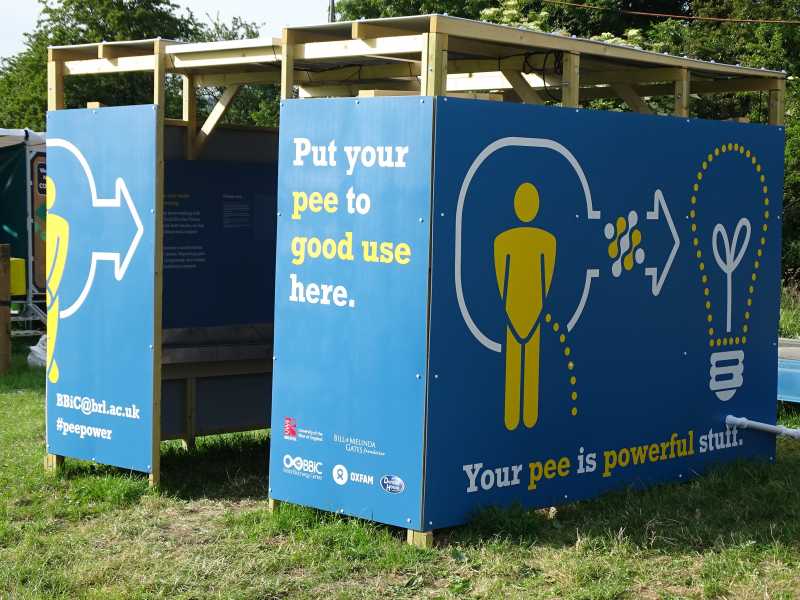 PeePowerur...iew1.jpg
(Filesize: 63KB)
PeePowerur...iew1.jpg
(Filesize: 63KB)
-
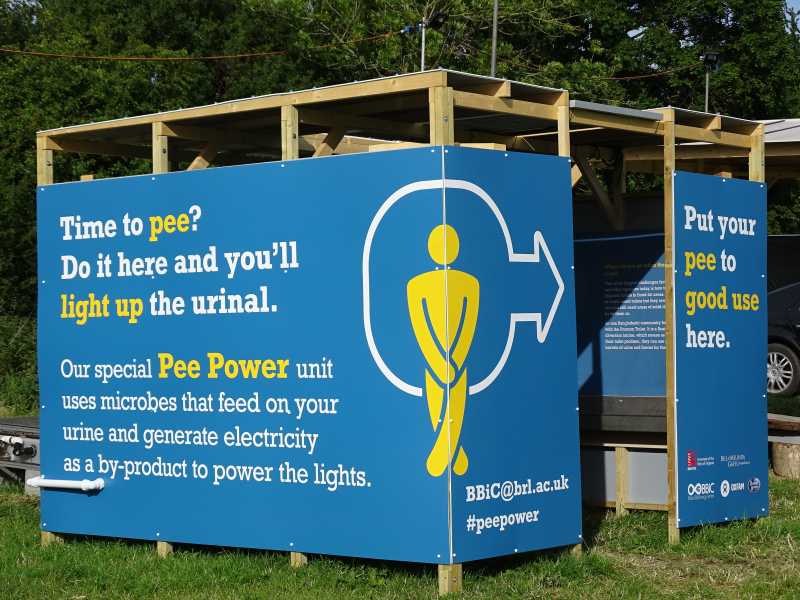 PeePowerur...iew2.jpg
(Filesize: 66KB)
PeePowerur...iew2.jpg
(Filesize: 66KB)
-
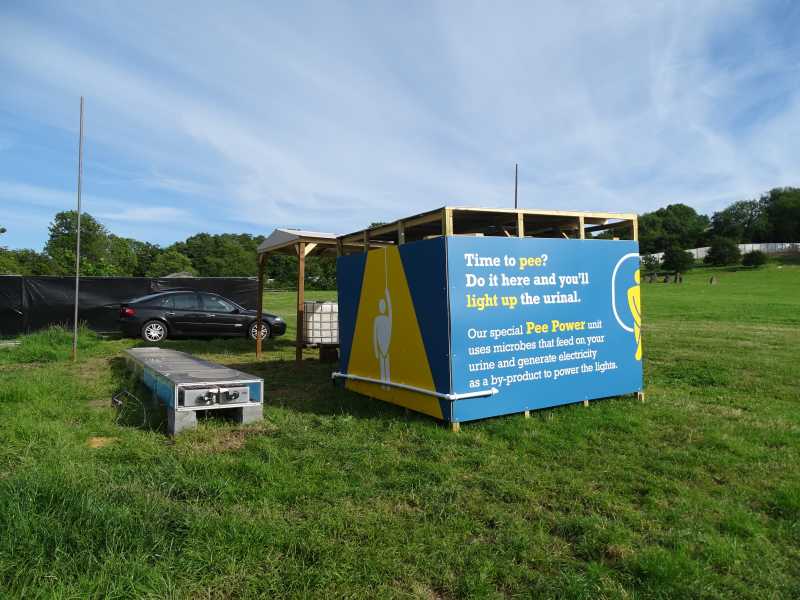 PeePowerur...view.jpg
(Filesize: 54KB)
PeePowerur...view.jpg
(Filesize: 54KB)
-
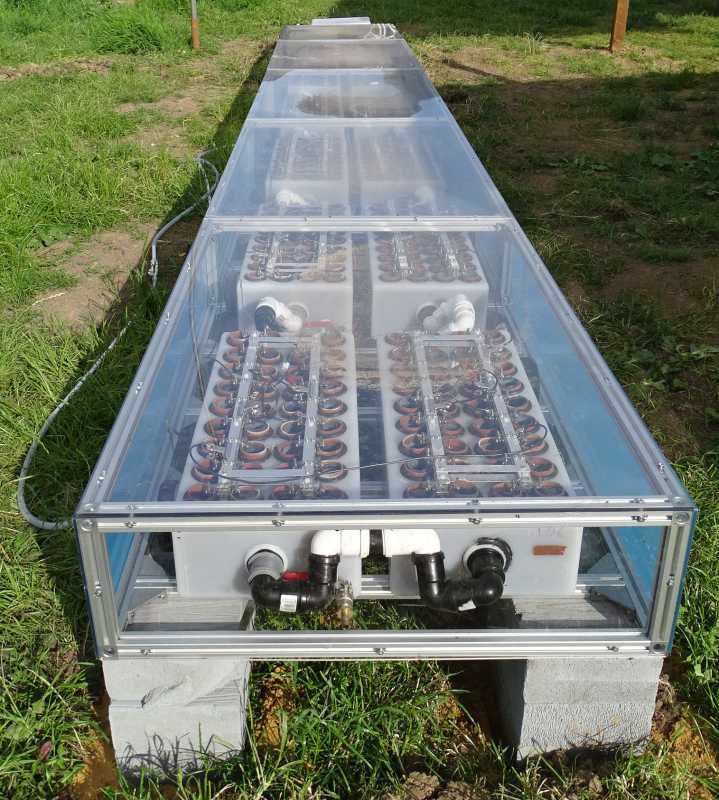 PeePowermi...ells.jpg
(Filesize: 88KB)
PeePowermi...ells.jpg
(Filesize: 88KB)
Please Log in to join the conversation.
You need to login to reply- Elisabeth
-
- User is blocked
- Freelance consultant since 2012
Less- Posts: 3372
- Karma: 54
- Likes received: 932
Re: The Power of Pee
Dear Mughal and Joe,
I have moved your two posts into this existing thread where we have discussed the research that is going on in Bristol with producing electricity from urine in the past (please scrol up to see the previous posts).
Yannis has been very good with answering questions in the past, so if you have questions for him, I am sure he will answer them in this thread. It could also be good if he could give a general update on their progress here. (I will e-mail Yannis in case he misses these posts)
Regards,
Elisabeth
I have moved your two posts into this existing thread where we have discussed the research that is going on in Bristol with producing electricity from urine in the past (please scrol up to see the previous posts).
Yannis has been very good with answering questions in the past, so if you have questions for him, I am sure he will answer them in this thread. It could also be good if he could give a general update on their progress here. (I will e-mail Yannis in case he misses these posts)
Regards,
Elisabeth
Dr. Elisabeth von Muench
Freelance consultant on environmental and climate projects
Freelance consultant on environmental and climate projects
Please Log in to join the conversation.
You need to login to reply- joeturner
-
 Less
Less- Posts: 717
- Karma: 23
- Likes received: 185
Interesting, but it does not seem to say how much electrical light could be produced from this system.
For those outside the UK, £600 is about $US880 or 830 Euro - and not clear if this includes the costs of the lightbulbs.
For those outside the UK, £600 is about $US880 or 830 Euro - and not clear if this includes the costs of the lightbulbs.
Please Log in to join the conversation.
You need to login to replyAccording to the Oxfam press release of 5 March 2015, a research team led by Prof. Ioannis Ieropoulos, Director of the Bristol BioEnergy Centre, Bristol Robotics Laboratory at the University of West of England (UWE Bristol), says that pee can generate electricity.
Students and staff are being asked to use the urinal to donate pee to fuel microbial fuel cell (MFC) stacks that generate electricity to power indoor lighting. The microbial fuel cells work by employing live microbes which feed on urine (fuel) for their own growth and maintenance. The MFC is, in effect, a system which taps a portion of that biochemical energy used for microbial growth, and converts that directly into electricity. This technology is about as green as it gets, using a waste product that will be in plentiful supply.
The urinal on the University campus resembles toilets used in refugee camps by Oxfam to make the trial as realistic as possible. The technology that converts the urine into power sits underneath the urinal and can be viewed through a clear screen.
According to Prof. Ieropoulos, one microbial fuel cell costs about £1 to make. The small unit like the demo, mocked up for the experiment could cost as little as £600 to set up, which is a significant bonus as this technology is, in theory, everlasting.
Andy Bastable, Head of Water and Sanitation at Oxfam, says, “Oxfam is an expert at providing sanitation in disaster zones, and it is always a challenge to light inaccessible areas far from a power supply. This technology is a huge step forward. Living in a refugee camp is hard enough without the added threat of being assaulted in dark places at night. The potential of this invention is huge.”
Both Prof. Ieropoulos and Andy Bastable agree it is the cheap, sustainable aspect of this technology, which relies on the abundant, free supply of urine that makes it so practical for aid agencies to use in the field.
More details can be seen at:
www.oxfam.org/en/pressroom/pressreleases...camps-disaster-zones
F H Mughal
F H Mughal (Mr.)
Karachi, Pakistan
Karachi, Pakistan
Please Log in to join the conversation.
You need to login to reply- iaieropoulos
-
 Topic Author
Topic Author- Converting waste into useful energy
Less- Posts: 11
- Karma: 1
- Likes received: 3
Re: Materials and feedback from Reinvent the Toilet Fair (Bill and Melinda Gates Foundation funded) in Delhi, India, 21-22 March 2014 - videos now available
RTTF was an extremely important event for us here at BRL, not only to showcase and demonstrate our MFC technology but the fair also provided an invaluable tool to understand other technologies being developed worldwide, that otherwise we may have been unaware of. It also provided the opportunity to identify and discuss future collaborations.
Dr. Ioannis A. Ieropoulos
Associate Professor
EPSRC Career Acceleration Fellow
BioEnergy & Self Sustainable Systems Theme Leader
Bristol Robotics Laboratory
T-Building
Frenchay Campus, (North Entrance)
Bristol, BS16 1QY
Tel: +44(0)1173286318, 86322 Fax: +44(0)1173283960
Email: This email address is being protected from spambots. You need JavaScript enabled to view it. Web: www.brl.ac.uk/researchthemes/bioenergyselfsustainable.aspx
Associate Professor
EPSRC Career Acceleration Fellow
BioEnergy & Self Sustainable Systems Theme Leader
Bristol Robotics Laboratory
T-Building
Frenchay Campus, (North Entrance)
Bristol, BS16 1QY
Tel: +44(0)1173286318, 86322 Fax: +44(0)1173283960
Email: This email address is being protected from spambots. You need JavaScript enabled to view it. Web: www.brl.ac.uk/researchthemes/bioenergyselfsustainable.aspx
Please Log in to join the conversation.
You need to login to reply- iaieropoulos
-
 Topic Author
Topic Author- Converting waste into useful energy
Less- Posts: 11
- Karma: 1
- Likes received: 3
The Bristol Robotics Lab, a collaboration between UWE Bristol and the University of Bristol has received Phase II funding through Grand Challenges Explorations, an initiative created by the Bill & Melinda Gates Foundation that enables individuals worldwide to test bold ideas to address persistent health and development challenges.
Phase II of the project, will last for two years and will see us take the technology out of the lab and into the Developing World.
The essence of this project is to develop Microbial Fuel Cells into a mature sustainable energy technology with a direct application in everyday life that could change the way people perceive waste and energy. The expectation from this is that the MFC technology will be developed to a level of maturity and appropriate scale so that it becomes a serious contender for direct waste and wastewater utilization into useful levels of electrical energy.
++++++++++++
From the BMGF grant database:
www.gatesfoundation.org/How-We-Work/Quic...s/2013/10/OPP1094890
Amount: $780,787
Purpose: to develop Microbial Fuel Cells into a mature sustainable energy technology with a direct application in everyday life, at or near to the intended use that could change the way people think about energy and human waste.
Phase II of the project, will last for two years and will see us take the technology out of the lab and into the Developing World.
The essence of this project is to develop Microbial Fuel Cells into a mature sustainable energy technology with a direct application in everyday life that could change the way people perceive waste and energy. The expectation from this is that the MFC technology will be developed to a level of maturity and appropriate scale so that it becomes a serious contender for direct waste and wastewater utilization into useful levels of electrical energy.
++++++++++++
From the BMGF grant database:
www.gatesfoundation.org/How-We-Work/Quic...s/2013/10/OPP1094890
Amount: $780,787
Purpose: to develop Microbial Fuel Cells into a mature sustainable energy technology with a direct application in everyday life, at or near to the intended use that could change the way people think about energy and human waste.
Dr. Ioannis A. Ieropoulos
Associate Professor
EPSRC Career Acceleration Fellow
BioEnergy & Self Sustainable Systems Theme Leader
Bristol Robotics Laboratory
T-Building
Frenchay Campus, (North Entrance)
Bristol, BS16 1QY
Tel: +44(0)1173286318, 86322 Fax: +44(0)1173283960
Email: This email address is being protected from spambots. You need JavaScript enabled to view it. Web: www.brl.ac.uk/researchthemes/bioenergyselfsustainable.aspx
Associate Professor
EPSRC Career Acceleration Fellow
BioEnergy & Self Sustainable Systems Theme Leader
Bristol Robotics Laboratory
T-Building
Frenchay Campus, (North Entrance)
Bristol, BS16 1QY
Tel: +44(0)1173286318, 86322 Fax: +44(0)1173283960
Email: This email address is being protected from spambots. You need JavaScript enabled to view it. Web: www.brl.ac.uk/researchthemes/bioenergyselfsustainable.aspx
Please Log in to join the conversation.
You need to login to reply- iaieropoulos
-
 Topic Author
Topic Author- Converting waste into useful energy
Less- Posts: 11
- Karma: 1
- Likes received: 3
Hello everyone
Please have a look at our videos taken at the highly successful Reinvent the Toilet Fair in Delhi in March 2014.
Interview with Elisabeth about my project as well as explanations about the exhibit - a functional prototype working with artificial urine:
Further explanations on microbioal fuel cells: how they work, how long they last, what they currently cost (questions asked by Arno Rosemarin):
Regards,
Yannis
P.S. Two photos from the exhibit at the fair for people who cannot view Youtube videos:
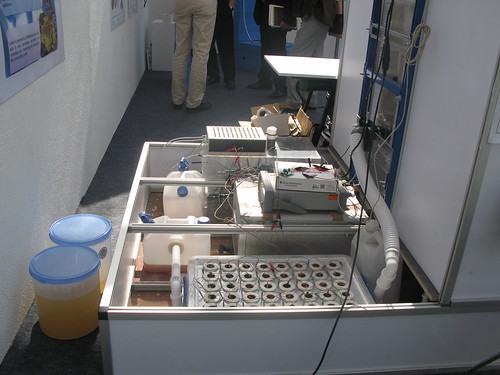 Microbial fuel cell stack that converts urine into electricity
by
Sustainable sanitation
, on Flickr
Microbial fuel cell stack that converts urine into electricity
by
Sustainable sanitation
, on Flickr
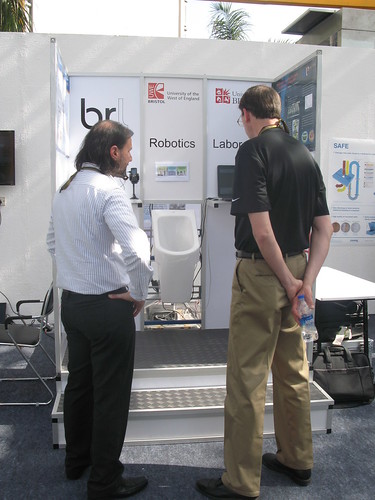 Urinal that converts urine into electricity for mobile phone charging
by
Sustainable sanitation
, on Flickr
Urinal that converts urine into electricity for mobile phone charging
by
Sustainable sanitation
, on Flickr
Please have a look at our videos taken at the highly successful Reinvent the Toilet Fair in Delhi in March 2014.
Interview with Elisabeth about my project as well as explanations about the exhibit - a functional prototype working with artificial urine:
Further explanations on microbioal fuel cells: how they work, how long they last, what they currently cost (questions asked by Arno Rosemarin):
Regards,
Yannis
P.S. Two photos from the exhibit at the fair for people who cannot view Youtube videos:


Dr. Ioannis A. Ieropoulos
Associate Professor
EPSRC Career Acceleration Fellow
BioEnergy & Self Sustainable Systems Theme Leader
Bristol Robotics Laboratory
T-Building
Frenchay Campus, (North Entrance)
Bristol, BS16 1QY
Tel: +44(0)1173286318, 86322 Fax: +44(0)1173283960
Email: This email address is being protected from spambots. You need JavaScript enabled to view it. Web: www.brl.ac.uk/researchthemes/bioenergyselfsustainable.aspx
Associate Professor
EPSRC Career Acceleration Fellow
BioEnergy & Self Sustainable Systems Theme Leader
Bristol Robotics Laboratory
T-Building
Frenchay Campus, (North Entrance)
Bristol, BS16 1QY
Tel: +44(0)1173286318, 86322 Fax: +44(0)1173283960
Email: This email address is being protected from spambots. You need JavaScript enabled to view it. Web: www.brl.ac.uk/researchthemes/bioenergyselfsustainable.aspx
The following user(s) like this post: PatrickBBB
Please Log in to join the conversation.
You need to login to reply
Share this thread:
- Forum
- categories
- Resource recovery
- Resource recovery from excreta, faecal sludge or wastewater
- Production of biochar, fuel or electricity
- Urine-tricity - Electricity from urine (University of the West of England, UK) - updates
Recently active users. Who else has been active?
Time to create page: 0.236 seconds








